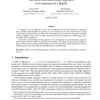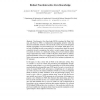93 search results - page 11 / 19 » Unifying Zero-Knowledge Proofs of Knowledge |
EUROCRYPT
2008
Springer
13 years 9 months ago
2008
Springer
A shuffle of a set of ciphertexts is a new set of ciphertexts with the same plaintexts in permuted order. Shuffles of homomorphic encryptions are a key component in mix-nets, whic...
SIAMCOMP
2008
13 years 6 months ago
2008
We investigate structural properties of interactive perfect zero-knowledge (PZK) proofs. Specifically, we look into the closure properties of PZK languages under monotone boolean ...
CRYPTO
2001
Springer
14 years 4 days ago
2001
Springer
Abstract. Non-Interactive Zero Knowledge (NIZK), introduced by Blum, Feldman, and Micali in 1988, is a fundamental cryptographic primitive which has attracted considerable attentio...
FOCS
2003
IEEE
14 years 28 days ago
2003
IEEE
We show how a polynomial-time prover can commit to an arbitrary finite set Ë of strings so that, later on, he can, for any string Ü, reveal with a proof whether Ü ¾ Ë or Ü ...
SP
2008
IEEE
13 years 6 months ago
2008
IEEE
e an abstraction of zero-knowledge protocols that is le to a fully mechanized analysis. The abstraction is formalized within the applied pi-calculus using a novel equational theor...


